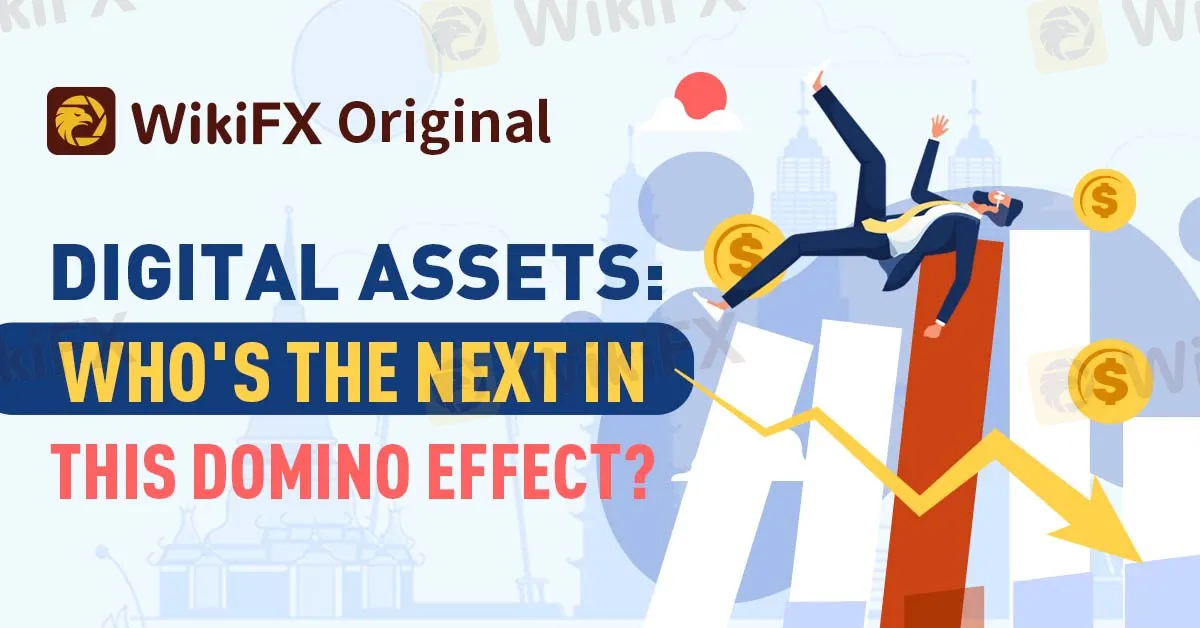简体中文
繁體中文
English
Pусский
日本語
ภาษาไทย
Tiếng Việt
Bahasa Indonesia
Español
हिन्दी
Filippiiniläinen
Français
Deutsch
Português
Türkçe
한국어
العربية
Digital Assets: Who's the Next in this Domino Effect?
Abstract:The FTX saga is in its final and messy place. The search for the next potential domino arises as margin calls and the destructive evaporation of collateral in the DeFi space continue. Recently, there have been talks that Crypto.com and its CRO cryptocurrency could be the next to tumble in this Domino Effect.

The topic started on Twitter, where Crypto.com was getting ripped. This speculation sent Crypto.com's CRO to drop by approximately 50% in the past few days.
A screenshot of Etherscan posted by a Twitter user shows a large amount of cryptocurrency flowing from the Crypto.com cryptocurrency exchange to another exchange, Gate.io. “Does anyone know why Crypto.com sent 320,000 ETH (82% of their ETH today) to Gate.io on October 21? And why would Gate.io send 285K ETH back to Crypto.com 5-7 days later?”

Kris Marszalek, CEO of Crypto.com, replied.“ Originally this was supposed to be transferred to a new cold wallet address but was sent to an external exchange address that was in a whitelist. We worked with the Gate team, and the funds were then returned to our cold wallet.” He later clarified that all funds had been returned.

Many investors took to Twitter to express their anger over the matter, especially over FTX's bankruptcy announcement. They reacted with horror to the news that the platform had accidentally sent such a large percentage of their money elsewhere through carelessness and that such a huge mistake had occurred without any safeguards.
The spectacular public collapse of FTX last week has already put the cryptocurrency market on edge. When FTX filed for bankruptcy, it had previously been one of the biggest exchanges in the world. According to a Reuters report, FTX had at least $1 billion in client funds missing.
According to participants in the cryptocurrency industry, Changpeng Zhao, the CEO of Crypto.com's largest rival, Binance, appeared to question the nature of the transfers without identifying the company, which may have sparked Sunday's withdrawals, as reported by the Wall Street Journal.
Zhao tweeted on Sunday, It is a clear sign of problems if an exchange [has] to move large amounts of cryptocurrency before or after they demonstrate their wallet addresses.
Later on Sunday, Marszalek tweeted that the October transfers had “generated so much [fear, uncertainty, and doubt] & speculation on Twitter” weeks later, dismissing the worries about Crypto.com.
A representative for Crypto.com stated that the platform was experiencing increased activity and pointed out that its assets completely matched customer deposits.
The levels of service are unaffected by fluctuations in deposit and withdrawal activity, he continued.

Disclaimer:
The views in this article only represent the author's personal views, and do not constitute investment advice on this platform. This platform does not guarantee the accuracy, completeness and timeliness of the information in the article, and will not be liable for any loss caused by the use of or reliance on the information in the article.
Read more

What Are The Common Types of Unregulated Forex Brokers?
Protect your investments from unregulated forex brokers with these tips. Learn about red flags, scams, and how the WikiFX app ensures safe trading experiences worldwide.

Pros and Cons of Choosing Unregulated Forex Brokers
Discover the pros and cons of unregulated forex brokers, explore risks, benefits, and key features, and learn how to evaluate their credibility with the WikiFX app.

5 Questions to Ask Yourself Before Taking a Trade
Before executing any trade, traders should pause and ask themselves critical questions to ensure they are making rational and well-informed decisions. Here are five questions to help you reflect on your strategy, manage risk, and control emotions before entering the market.

Gigamax Scam: Tracking Key Suspects in RM7 Million Crypto Fraud
Malaysian authorities are actively pursuing seven individuals linked to the Gigamax investment scam, which has defrauded investors of over RM7 million. The suspects include an Indonesian national, identified as Awaludin, who is believed to be the mastermind behind the scheme, and six Malaysians who served as promoters and speakers for the fraudulent operation.
WikiFX Broker
Latest News
Geopolitical Events: What They Are & Their Impact?
Volkswagen agrees deal to avoid Germany plant closures
Top 10 Trading Indicators Every Forex Trader Should Know
TradingView Launches Liquidity Analysis Tool DEX Screener
MultiBank Group Wins Big at Traders Fair Hong Kong 2024
WikiEXPO Global Expert Interview: Simone Martin—— Exploring Financial Regulation Change
'Young investors make investment decisions impulsively to keep up with current trends' FCA Reveals
Why Do You Feel Scared During Trade Execution?
CySEC Settles Compliance Case with Fxview Operator Charlgate Ltd
Scope Markets Review: Trustworthy or Risky?
Currency Calculator


